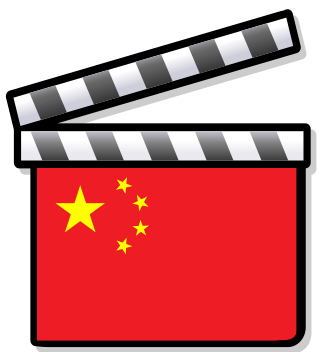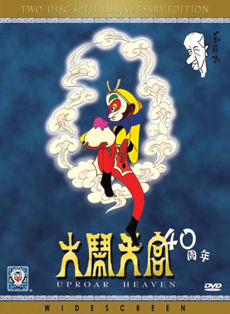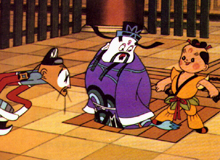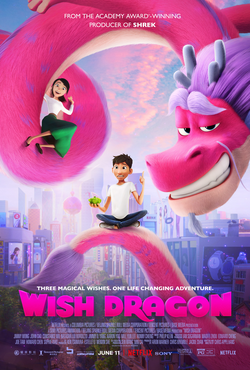Related Research Articles

The cinema of China is the filmmaking and film industry of the Chinese mainland under the People's Republic of China, one of three distinct historical threads of Chinese-language cinema together with the cinema of Hong Kong and the cinema of Taiwan.

Nezha is a protection deity in Chinese Buddhism, Confucianism, Taoism, and Chinese folk religion. His official Taoist name is "Marshal of the Central Altar" (中壇元帥). He was then given the title "Third Lotus Prince" (蓮花三太子) after he became a deity.
Chinese animation refers to animation made in China. In Chinese, donghua describes all animated works, regardless of style or origin. However, outside of China and in English, donghua is colloquial for Chinese animation and refers specifically to animation produced in China.
The history of Chinese animation began in the 20th century in the Republic of China when the people became fascinated with the idea of animation. A lengthy history interlocks between the art, politics and the ever-changing economy. Chinese animation has long been under the shadow of Disney and Japanese animations, but it once played a very important role in world animation.
Shanghai Animation Film Studio, also known as SAFS, is a Chinese animation studio based in Shanghai, China, as part of the Shanghai Film Group Corporation. Shanghai Animation Film Studio was officially established in April 1957, led by pioneering animators and artists, including Te Wei, and the Wan Brothers. It has produced around 500 films with over 40,000 minutes of original animation data source, covering 80% of China's domestic animation production.

Havoc in Heaven, also translated as Uproar in Heaven, is a Chinese donghua feature film directed by Wan Laiming and produced by all four of the Wan brothers. The film was created at the height of the Chinese animation industry in the 1960s, and received numerous awards, earning the brothers domestic and international recognition. The story is an adaptation of the earlier episodes of the 16th-century Chinese novel Journey to the West.

The Legend of Sealed Book is a Chinese animated feature film produced by Shanghai Animation Film Studio. It is also referred to as Book Which Came from the Sky, Tales about the Heavenly Book and Secrets of the Heavenly Book.
Ao Bing is a character in the classic Chinese novel Investiture of the Gods. He is a dragon prince and the third son of the East Sea Dragon King Ao Guang of the Crystal Palace. He has two brothers named Ao Jia and Ao Yi. Both of them are older than him. Ao Bing was originally revered as a rain god who would bestow the rain at his command upon any individual in need, but, as time passed, his father became corrupt, and soon the people were living in fear of the stormy malevolence of Ao Guang and his three sons. After the divine child-hero Nezha had slain the yaksha Li Gen and been seen creating tremors that threatened to destroy the Crystal Palace of the Dragon King, Ao Bing set out to confront Nezha, riding upon a great green beast and accompanied by his father's troops.
The BigScreen Festival or BigScreen Italia is a film festival that focuses on Chinese and Italian cinema. It was first held in 2004 in Padua, Italy, but in 2006 moved to Kunming, Yunnan, China.

Chris Bailey is an American animator and film director.

Nezha Conquers the Dragon King is a 1979 Chinese animated fantasy film produced by Shanghai Animation Film Studio. It was screened out of competition at the 1980 Cannes Film Festival, listed under the English title Prince Nezha's Triumph Against Dragon King, and was released in the United Kingdom as Little Nezha Fights Great Dragon Kings.

The King of Pigs is a 2011 South Korean adult animated psychological drama thriller film directed by Yeon Sang-ho. It was Sang-ho's debut film, and was based on many of his former experiences in high school. The film was selected to be screened in the Directors' Fortnight section at the 2012 Cannes Film Festival, making it the first Korean film of its kind to be screened in Cannes. The film was highly polarizing, but was mostly praised for its realistic portrayal of bullying, violence, and systemic poverty and won three awards at the 2011 Busan International Film Festival. As the first adult animated film produced in South Korea, it, along with the film at the same year, Leafie, A Hen into the Wild, was responsible for South Korea's increase in legitimacy in the animation industry.
Events in 1979 in animation.

Wish Dragon is a 2021 animated fantasy comedy film written and directed by Chris Appelhans and produced by Sony Pictures Animation and Tencent Pictures. The film stars Jimmy Wong, John Cho, Constance Wu, Natasha Liu Bordizzo, Jimmy O. Yang, Aaron Yoo, Will Yun Lee, and Ronny Chieng. Jackie Chan produced the film and voiced Cho's role in the Chinese Mandarin version.
The Pingyao International Film Festival (PYIFF), officially as "Pingyao Crouching Tiger, Hidden Dragon International Film Festival", is a film festival held in Pingyao, Shanxi, China. It was launched in October 2017 by Jia Zhangke, a Chinese film director, screenwriter and leading figure of the "Sixth Generation" movement of Chinese cinema and prestigious festival director Marco Müller. The festival's goal is to bring attention to works done by young, lesser known directors in the Chinese film industry, as well as to encourage communication and cooperation between Chinese and international filmmakers.

Ne Zha, also spelled Nezha, is a 2019 Chinese 3D computer-animated fantasy adventure film directed and written by Yu Yang, credited as Jiaozi. Its animation production is done by the director's own Chengdu Coco Cartoon. Featuring the popular Chinese mythological character Nezha, the plot is loosely based on the classic 16th-century novel Investiture of the Gods, attributed to Xu Zhonglin.
The Monkey King Conquers the Demon is a 1985 Chinese donghua feature film directed by Te Wei, Lin Wenxiao, and Ding Xianyan and produced by the Shanghai Animation Film Studio. The film serves as a loose sequel to Havoc in Heaven, and adapts later episodes in the 16th century Chinese novel Journey to the West.

New Gods: Nezha Reborn is a 2021 Chinese 3D animated fantasy action film directed by Zhao Ji and written by Mu Chuan, based on the character of Nezha from the Ming dynasty novel Investiture of the Gods. In the film, a steampunk and cyberpunk take on the story, Nezha is reincarnated as Li Yunxiang in the fictional city of Donghai and must settle a 3,000-year-old grudge with the Dragon Clan. New Gods: Yang Jian was released in 2022 as a sequel to this film.
References
- 1 2 Macdonald, Sean (November 2015). "Animation as Intertextual Cinema: Nezha Naohai (Nezha Conquers the Dragon King)". Animation. 10 (3): 205–221. doi:10.1177/1746847715605608. S2CID 194154605.
- 1 2 Wang Yiqian. "In Memory of My Father Wang Shuchen". In Yan Du, Daisy (ed.). Chinese Animation and Socialism. Brill. ISBN 9789004499607 . Retrieved 4 September 2022.
- ↑ Yin, Xiyong (1 January 2022). "Those Who Should Not be Forgotten". Those Who Should Not Be Forgotten In. pp. 207–214. doi:10.1163/9789004499607_016. ISBN 9789004499607. S2CID 243113765 . Retrieved 5 September 2022.
- ↑ Yan, Shanchun (1 January 2022). "From Layman to Animator". China Studies: 103–114. doi:10.1163/9789004499607_009. ISBN 9789004499607. S2CID 243448894.
- ↑ "NEZHA NAO HAI - Festival de Cannes". www.festival-cannes.com. Retrieved 5 September 2022.